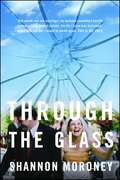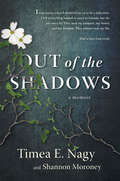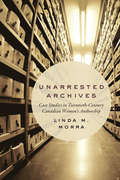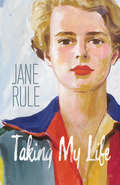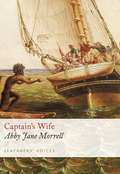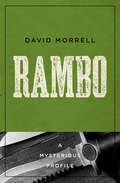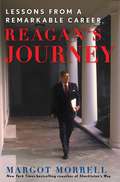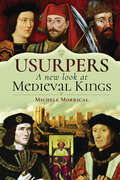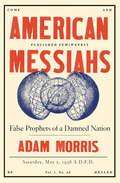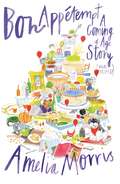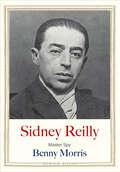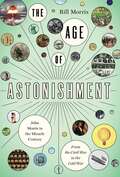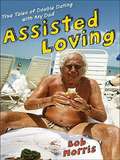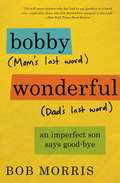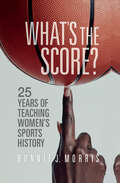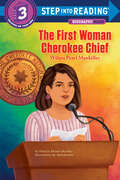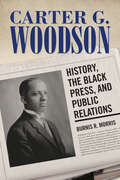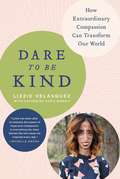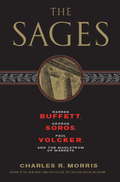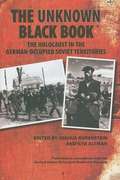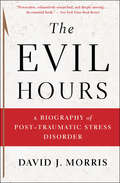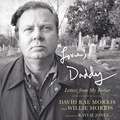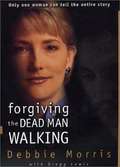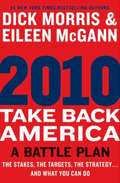- Table View
- List View
Through the Glass
by Shannon Moroney"One month into our marriage, my husband committed horrific violent crimes. In that instant, the life I knew was destroyed. I vowed that one day I would be whole again. This is my story." An impassioned, harrowing, and ultimately hopeful story of one woman's pursuit of justice, forgiveness, and healing. When Shannon Moroney got married in October 2005, she had no idea that her happy life as a newlywed was about to come crashing down around her. One month after her wedding, a police officer arrived at her door to tell her that her husband, Jason, had been arrested and charged in the brutal assault and kidnapping of two women. In the aftermath of these crimes, Shannon dealt with a heavy burden of grief, the stress and publicity of a major criminal investigation, and the painful stigma of guilt by association, all while attempting to understand what had made Jason turn to such violence. In this intimate and gripping journey into prisons, courtrooms, and the human heart, Shannon reveals the far-reaching impact of Jason's crimes and the agonizing choices faced by the loved ones of offenders. In so doing, she addresses the implicit dangers of a correctional system and a society that prioritize punishment over rehabilitation and victimhood over recovery.
Out of the Shadows: A Memoir
by Shannon Moroney Timea NagyAn unforgettable story of an ordinary woman in astonishing circumstances who defies the odds.Timea Nagy was twenty years old when she answered a newspaper ad in Budapest, Hungary, calling for young women to work as babysitters and housekeepers in Canada. Hired by what seemed like a legitimate recruitment agency, Timea left her home believing she would earn good money to send back to her family. What she didn't know was that she'd been lured by a ring of international human traffickers--and her life would never again be the same.Upon her arrival in Toronto, she was forced into sex labour in some of the city's seediest nightclubs, starved and controlled by her agents, and brainwashed to believe she was to blame for her situation. The only way she'd be free was when her debt was paid--but, no matter how hard she worked, that debt seemed only to go up, not down.Out of the Shadows is a gripping, heartbreaking and eye-opening journey deep into the underworld of human trafficking and the sex trade, told in riveting detail by one brave survivor. At once tragic and powerfully redemptive, Timea Nagy's story will stay with you long after you've read the last page.
Unarrested Archives
by Linda M. MorraCalling upon the archives of Canadian writers E. Pauline Johnson (1861-1913), Emily Carr (1871-1945), Sheila Watson (1909-1998), Jane Rule (1931-2007), and M. NourbeSe Philip (1947- ), Linda M. Morra explores the ways in which women's archives have been uniquely conceptualized in scholarly discourses and shaped by socio-political forces. She also provides a framework for understanding the creative interventions these women staged to protect their records. Through these case studies, Morra traces the influence of institutions such as national archives and libraries, and regulatory bodies such as border service agencies on the creation, presentation, and preservation of women's archival collections.The deliberate selection of the five literary case studies allows Morra to examine changing archival practices over time, shifting definitions of nationhood and national literary history, varying treatments of race, gender, and sexual orientation, and the ways in which these forces affected the writers' reputations and their archives. Morra also productively reflects on Jacques Derrida's Archive Fever and postmodern feminist scholarship related to the relationship between writing, authority, and identity to showcase the ways in which female writers in Canada have represented themselves and their careers in the public record.
Taking My Life
by Linda Morra Jane RuleDiscovered in her papers as a handwritten manuscript in 2008, Jane Rule's autobiography is a rich and culturally significant document that follows the first twenty-one years of her life.In writing about her formative years, she is indeed "taking" the measure of her life, assessing its contours of pleasure and pain, and accounting precisely for how it evolved, with great discretion and consideration for those who might have been affected by being represented in her work. She appreciated the ambiguity of the title she chose, with all its implications of suicide: at the end of her writing life, she was submitting herself as a person, not only to the literary and cultural, but also the moral and ethical critique of her readers.At turns deeply moving and witty, Taking My Life probes in emotional and intellectual terms the larger philosophical questions that were to preoccupy her throughout her literary career, and showcases the origins and contexts that gave shape to Rule's rich intellectual life. Her autobiography will appeal to avid followers of her work, delighted to discover another of her works that has, until now, remained unpublished.
Captain's Wife: Seafarer's Voices
by Abby Jane Morrell&“Gives the reader a woman&’s perspective on life at sea aboard a schooner when conditions under sail were uncomfortable and, at times, dangerous.&” —The Northern Mariner During the nineteenth century it became increasingly common for merchant service masters to take their wives to sea, particularly in the whaling industry, where voyages of 2–3 years were not uncommon. Reflecting the sailors traditional dislike of women on board—seen as unlucky by the superstitious and disruptive by the more rational—these ships were derisively dubbed Hen Frigates and although they have been the fashionable subject of academic interest in recent years, there is not much literature by the women themselves. Among the first, and most accomplished, is Abby Jane Morrell&’s account of a voyage between 1829 and 1831 that took her from New England to the South Pacific. Her husband Benjamin was in the sealing trade but was a keen explorer, and his adventurous spirit led him and his wife into situations normally well outside the world of the Hen Frigate. Curiously, Benjamin also wrote an account of this voyage, but since he was described by a contemporary as the greatest liar in the Pacific, his wife&’s is a better record of what actually happened, even when dealing with dramatic incidents like the murderous attack by cannibal islanders. Apart from the descriptions of exotic places, much of the interest in this book is the traditional, centuries-old world of the sailor as seen through the eyes of a thoughtful and well-educated woman. As such it heads a long line of improving books aimed at ameliorating the seaman&’s lot. &“A book that absorbs and rewards the reader. Highly recommended.&” —Firetrench
Rambo: A Mysterious Profile (Mysterious Profiles)
by David MorrellThe New York Times–bestselling author tells the story behind the creation of his iconic character during an era of violence and polarization in America. In an era when the Vietnam War raged and police and protestors battled in the streets, a young writer introduced Rambo—a disillusioned and angry trained killer who&’d returned to America a ticking time bomb—in a novel called First Blood. The character would go on to appear in a wildly popular action film in which he led the authorities on an extraordinary manhunt, as well as in several sequels. Here, award–winning author David Morrell reveals the origins of the now world-famous figure and the influences that shaped him in this surprising and candid essay. Previously published under the title Rambo and Me
Reagan's Journey
by Margot MorrellA RENOWNED LEADERSHIP EXPERT EXAMINES THE LIFE OF R ONALD REAGAN, EXTRACTING THE KEY C OMPONENTS OF HIS IMMENSE S UCCESS--PERSONAL AND PROFESSIONAL--AND OFFERS AN ILLUMINATING MODEL F OR LEADERS AND MANAGERS IN EVERY WALK OF LIFE. Since leaving office, Ronald Reagan has emerged as among America's greatest-- and best-loved--leaders. Today he is known as "the Great Communicator," but in the course of his sixty-year career, Reagan faced obstacles and hardships that could have stalled him at any point along the way. After every disaster, he picked himself up and kept moving forward. How did he manage his career and handle the hurdles involved in transitioning from actor and union official into a public speaker in high demand and from there into an extraordinarily successful politician? What can we learn from the way the perennial "new kid in town" muscled through adversities, maintained his focus, stayed true to his principles, and achieved his goals? In a compelling narrative that is both a motivational leadership teaching tool and a fascinating biography, bestselling author Margot Morrell sheds light on the challenges and heartbreaks that shaped Ronald Reagan. Four times his life slammed into a brick wall: his 1948 divorce from actress Jane Wyman; the termination of his long-standing contract with Warner Bros.; the end of his eight-year association with General Electric; and a hard-fought loss to President Gerald Ford in the 1976 primary campaign. Setting politics and policies largely aside, Morrell highlights the strategies and tactics Ronald Reagan used to transform himself from shy introvert to confident communicator; the methods and tools he employed to keep his career on track; and the skills he developed that led to his many accomplishments. Each chapter of Reagan's Journey is followed by summary bullet points and an essential overview titled "Working It In," to facilitate these lessons into your formation as a leader. Anyone interested in strengthening their leadership and communications skills, becoming more resilient in the face of setbacks, or taking their careers to the next level will find practical and useful lessons in the life of Ronald Reagan.
Usurpers, A New Look at Medieval Kings
by Michele MorricalIn the Middle Ages, England had to contend with a string of usurpers who disrupted the British monarchy and ultimately changed the course of European history by deposing England’s reigning kings and seizing power for themselves. Some of the most infamous usurper kings to come out of medieval England include William the Conqueror, Stephen of Blois, Henry Bolingbroke, Edward IV, Richard III, and Henry Tudor. Did these kings really deserve the title of usurper or were they unfairly vilified by royal propaganda and biased chroniclers? In this book we examine the lives of these six medieval kings, the circumstances which brought each of them to power, and whether or not they deserve the title of usurper. Along the way readers will hear stories of some of the most fascinating people from medieval Europe, including Empress Matilda, the woman who nearly succeeded at becoming the first ruling Queen of England; Eleanor of Aquitaine, the queen of both France and England who stirred her own sons to rebel against their father, Henry II; the cruel and vengeful reign of Richard II which caused his own family to overthrow him; the epic struggle for power between Henry VI, Margaret of Anjou, Richard of York, and Edward IV during the Wars of the Roses; the notorious Richard III and his monstrous reputation as a child-killer; and Henry VII who rose from relative obscurity to establish the most famous royal family of all time: the Tudors.
Reporting the First World War: Charles Repington, The Times and the Great War, 1914–1918 (Cambridge Military Histories)
by A. J. A. MorrisCharles Repington was Britain's most influential military correspondent during the first two decades of the twentieth century. From 1914 to 1918, Repington's commentary in The Times, 'The War Day by Day', was read and discussed by opinion-shapers and decision-makers worldwide who sought to better understand the momentous events happening around them, and his subsequently published diaries offered a compelling portrait of England's governing class at war. This is the first major study of Repington's life and career from the Boer War to the end of the Great War. A. J. A. Morris presents unique insights into the conduct of the First World War and into leading figures in the British high command: French, Haig, Robertson, Wilson. The book offers modern readers a rewardingly fresh understanding of the conflict, and will appeal to scholars of the First World War and British political and military history of the period. First major study of Charles Repington, Britain's most influential military correspondent of the early twentieth century. Examines Repington's daily column in The Times during the Great War, and how it helped shape understanding of the war's events. Presents unique insights into the conduct of the First World War and into leading figures in the British high commands.
American Messiahs: False Prophets Of A Damned Nation
by Adam MorrisA history with sweeping implications, American Messiahs challenges our previous misconceptions about “cult” leaders and their messianic power. Mania surrounding messianic prophets has defined the national consciousness since the American Revolution. From Civil War veteran and virulent anticapitalist Cyrus Teed, to the dapper and overlooked civil rights pioneer Father Divine, to even the megalomaniacal Jim Jones, these figures have routinely been dismissed as dangerous and hysterical outliers. After years of studying these emblematic figures, Adam Morris demonstrates that messiahs are not just a classic trope of our national culture; their visions are essential for understanding American history. As Morris demonstrates, these charismatic, if flawed, would-be prophets sought to expose and ameliorate deep social ills—such as income inequality, gender conformity, and racial injustice. Provocative and long overdue, this is the story of those who tried to point the way toward an impossible “American Dream”: men and women who momentarily captured the imagination of a nation always searching for salvation.
Bon Appetempt: A Coming-of-Age Story (with Recipes!)
by Amelia MorrisWhen Amelia Morris saw a towering, beautiful chocolate cake in Bon Appétit and took the recipe home to recreate it for a Christmas day brunch she was hosting, it resulted in a terrible (but tasty) mess that had to be served in an oversize bowl. It was also a revelation. Both delicious and damaged, it seemed a physical metaphor for the many curious and unexpected situations she's found herself in throughout her life, from her brief career as a six-year-old wrestler to her Brady Bunch-style family (minus the housekeeper and the familial harmony) to her ill-fated twenty-something job at the School of Rock in Los Angeles. As a way to bring order to chaos and in search of a more meaningful lifestyle, she finds herself more and more at home in the kitchen, where she begins to learn that even if the results of her culinary efforts fall well short of the standard set by glossy food magazines, they can still bring satisfaction (and sustenance) to her and her family and friends. Full of hilarious observations about food, family, unemployment, romance, and the extremes of modern L.A., and featuring recipes as basic as Toasted Cheerios and as advanced as gâteau de crêpes, BON APPÉTEMPT is sure to resonate with anyone who has tried and failed, and been all the better for it.
Sidney Reilly: Master Spy (Jewish Lives)
by Benny MorrisA revealing biography of Sidney Reilly, the early twentieth-century virtuoso of espionage Sidney Reilly (c. 1873–1925) is one of the most colorful and best-known spies of the twentieth century. Emerging from humble beginnings in southern Russia, Reilly was an inventive multilingual businessman and conman who enjoyed espionage as a sideline. By the early twentieth century he was working as an agent for Scotland Yard, spying on émigré communities in Paris and London, with occasional sorties to Germany, Russia, and the Far East. He spent World War I in the United States, brokering major arms deals for tsarist Russia, and then decided to become a professional spy, joining the ranks of MI6, Britain&’s foreign intelligence service. He came close to overthrowing the Bolshevik regime in Moscow before eventually being lured back to Russia and executed. Said to have been the inspiration for Ian Fleming&’s iconic James Bond character, Reilly was simultaneously married to three or four women and had mistresses galore. Sifting through the reality and the myth of Reilly&’s life, historian Benny Morris offers a fascinating portrait of one of the most intriguing figures from the golden age of spies.
The Age of Astonishment: John Morris in the Miracle Century—From the Civil War to the Cold War
by Bill MorrisAn acclaimed journalist and novelist makes history personal, painting a rich and vivid portrait of the time when America become modern by tracing the life of one man who lived through it.It all began with a black-and-white family snapshot of a distinguished elderly gentleman with a fine head of spun-sugar hair. He was wearing round, tortoise-shell glasses, a three-piece suit and an expression of delight mixed with terror, for on his right knee he was balancing a swaddled infant with a bewildered look. The baby is Bill morris, the man is his father&’s father, John Morris. That photo, taken in November 1952, the month the United States detonated the first hydrogen bomb, a weapon a thousand times more powerful than the atom bombs that incinerated Hiroshima and Nagasaki. Three years later, John Morris died at the age of 92. Bill has no memories of the man, but even as a boy he found himself marveling at the changes John must have witnessed and experienced in his long lifetime. He was born into a slave-owning Virginia family during the Civil War, and he died at the peak of the Cold War. At the time of his birth, the dominant technologies were the steam engine and the telegraph. He grew up in a world lit by kerosene and candles, he traveled by foot and horseback and wagon and drank water hauled from a well. He would live through Reconstruction, women&’s suffrage, Prohibition, the Great Depression, two world wars, the Korean War and the advent of nuclear weapons. Though he was from a slave-owning family, he changed his views as he grew into adulthood, and would unhappily witnessed the horrors of Jim Crow and work against it. Fluent in German, he would witness Hitler&’s rise to power, just one of the unimaginable occurrences of his time that suddenly became all-too-real. Deep in the Bible Belt, John was agnostic, perhaps even atheist, and held remarkably progressive beliefs on race relations, child rearing, women&’s rights and religious freedom. He married an Irish Catholic from upstate New York at a time when Catholics, Jews and Yankees were not warmly welcomed in the South. And in that traditionally bellicose region, he was a life-long pacifist. He was, in a word, a misfit, but one whose story embodies a pivotal generation in American history. An acclaimed journalist and novelist, Bill Morris makes history personal in The Age of Astonishment, painting a rich and vivid portrait of the time when America become modern by tracing the life of one man who lived through it.
Assisted Loving: True Tales of Double Dating with My Dad
by Bob MorrisWhat would you do if your eighty-year-old father dragged you into his hell-bent hunt for new love? Bob Morris, a seriously single son, tells you all about it in this warm, witty, and wacky chronicle of a year of dating dangerously.<p> A few months after the death of his wife, Joe Morris, an affable, eccentric, bridge-obsessed octogenarian, starts flapping about for a replacement. If he can get a new hip, he figures, why not a new wife? At first, his son Bob is appalled, but suspicion quickly turns to enthusiasm as he finds himself trolling the personals, screening prospects, and offering etiquette tips, chaperoning services, and post-date assessments to his needy father.<P> Bob hopes that Joe will find a well-heeled lady-or at least one who is very patient-to get him out of his hair. But soon they discover that finding a new mate will not be as easy as they think: one date is too morose, another too liberal; one's a three-timer, another just needs an escort until Mr. Right comes along. Dad persists and son assists. Am I pimping for my father? he begins to wonder. <P> Meanwhile, Bob suffers similar frustrations; trying to find love isn't easy in a big-city market that has little use for a middle-aged gay man with an attitude and a paunch. But with the encouragement of his father (his biggest fan and the world's "most democratic Republican") he prevails. In the end, this memoir becomes a twin love story and a soulful lesson about giving and receiving affection with an open heart.<P> With wicked humor and a dollop of compassion, Bob Morris gleefully explores the impact of senior parents on their boomer kids and the perils of dating at any age.
Bobby Wonderful: An Imperfect Son Buries His Parents
by Bob MorrisHis mother's last word was his name. His father's was "Wonderful." Together they inspired the title for this true story of love and redemption. Bob Morris was always the entertainer in his family, but not always a perfect son. When he finds his parents approaching the end of their lives, he begins to see his relationship to them in a whole new light and it changes his way of thinking.How does an adult child with flaws and limitations figure out how to do his best for his ailing parents while still carrying on and enjoying his own life? And when their final days on earth come, how can he give them the best possible end?In the tradition of bestselling memoirs by Christopher Buckley, Joan Didion, and with a dash of David Sedaris, BOBBY WONDERFUL recounts two poignant deaths and one family's struggle to find the silver lining in them. As accessible as he is insightful, Bob Morris infuses each moment of his profound emotional journey with dark comedy, spiritual inquiry and brutally honest self-examination. This is a little book. But it captures a big and universal experience.
What's the Score?: 25 Years of Teaching Women's Sports History
by Bonnie J. MorrisWho is the first female athlete you admired? Were male and female athletes treated differently in your high school? Is there a natural limit to women's athletic ability? How has Title IX opened up opportunities for women athletes?Every semester since 1996, Bonnie Morris has encouraged students to confront questions like these in one of the most provocative college courses in America: Athletics and Gender, A History of Women's Sports. What's the Score?, Morris's energetic teaching memoir, is a peek inside that class and features a decades-long dialogue with student athletes about the greater opportunities for women—on the playing field, as coaches, and in sports media. From corsets to segregated schoolyards to the WNBA, we find women athletes the world over conquering unique barriers to success.What's the Score? is not only an insider's look at sports education but also an engaging guide to turning points in women's sports history that everyone should know.
The First Woman Cherokee Chief: Wilma Pearl Mankiller (Step into Reading)
by Patricia Morris BuckleyFind out all about Wilma Pearl Mankiller, the first woman Cherokee chief whose image will appear on a 2022 US quarter, in this Step 3 Biography Reader.In 1985, Wilma Pearl Mankiller became the first woman Principal Chief of the Cherokee Nation. She had to convince her people that the chief should be the best person for the job, man or woman.Before the English came to what is now the United States, Cherokee women and men shared the leadership of the tribe. This created balance. But the English colonists told the Native People that men should be in charge. It stayed that way for many years, until Wilma Pearl Mankiller made history. She used the concept of gaduji, of everyone helping each other, to make the Cherokee Nation strong. Step 3 Readers feature engaging characters in easy-to-follow plots and popular topics—for children who are ready to read on their own.
Carter G. Woodson: History, the Black Press, and Public Relations (Race, Rhetoric, and Media Series)
by Burnis R. MorrisThis study reveals how historian Carter G. Woodson (1875-1950) used the black press and modern public relations techniques to popularize black history during the first half of the twentieth century. Explanations for Woodson's success with the modern black history movement usually include his training, deep-rooted principles, and single-minded determination. Often overlooked, however, is Woodson's skillful use of newspapers in developing and executing a public education campaign built on truth, accuracy, fairness, and education. Burnis R. Morris explains how Woodson attracted mostly favorable news coverage for his history movement due to his deep understanding of the newspapers' business and editorial models as well as his public relations skills, which helped him merge the interests of the black press with his cause.Woodson's publicity tactics, combined with access to the audiences granted him by the press, enabled him to drive the black history movement--particularly observance of Negro History Week and fundraising activities. Morris analyzes Woodson's periodicals, newspaper articles, letters, and other archived documents describing Woodson's partnership with the black press and his role as a publicist. This rarely explored side of Woodson, who was often called the "Father of Black History," reintroduces Woodson's lost image as a leading cultural icon who used his celebrity in multiple roles as an opinion journalist, newsmaker, and publicist of black history to bring veneration to a disrespected subject. During his active professional career, 1915-1950, Woodson merged his interests and the interests of the black newspapers. His cause became their cause.
Dare to Be Kind: How Extraordinary Compassion Can Transform Our World
by Catherine Avril Morris Lizzie VelasquezYouTube personality and celebrated motivational speaker Lizzie Velasquez shows us how we can learn to accept all parts of ourselves and others, and in doing so create a more compassionate world. Born with a rare genetic condition, Lizzie Velasquez always knew she was different, but not until she was older did she understand what that meant to others. At 17 years old, when she came across a viral video entitled "World's Ugliest Woman," only to discover that it featured her, she could no longer ignore what set her apart. She devoted herself to investigating the underlying sources of bullying and standing up on behalf of victims everywhere, creating one of the web's most popular YouTube channels and a TED talk that has drawn tens of millions of viewers. In this daring, inspirational book, Lizzie reveals the hidden forces that give rise to self-doubt, shame, and cruelty, and empowers us to redirect them to unlock empathy and kindness for ourselves and others. Through her own battles with anxiety and coping with disappointment, she demonstrates how we can overcome obstacles in our path and move forward with greater positivity and the right mental attitude. Brilliantly drawing on Lizzie's wisdom and sentiment, Dare to Be Kind presents the path to acceptance, love, and tolerance, and provides a framework to help us lead confident, resilient lives and, ultimately, forge a radically kind world.
The Sages: Warren Buffett, George Soros, Paul Volcker, and the Maelstrom of Markets
by Charles R. MorrisA bestselling author examines the perspectives and principles of three pillars of the financial world?as well as their judgments on the current crisis and the path to recovery
The Unknown Black Book: The Holocaust in the German-occupied Soviet Territories
by Christopher Morris Ilya Altman Joshua RubensteinThe Unknown Black Book provides, for the first time in English, a revelatory compilation of testimonies from Jews who survived open-air massacres and other atrocities carried out by the Germans and their allies in the occupied Soviet territories during World War II. These documents, from residents of cities, small towns, and rural areas, are first-hand accounts by survivors of work camps, ghettos, forced marches, beatings, starvation, and disease. Collected under the direction of two renowned Soviet Jewish journalists, Vasily Grossman and Ilya Ehrenburg, they tell of Jews who lived in pits, walled-off corners of apartments, attics, and basement dugouts, unable to emerge due to fear that their neighbours would betray them, which often occurred.
The Evil Hours: A Biography of Post-Traumatic Stress Disorder
by David J. Morris&“An essential book&” on PTSD, an all-too-common condition in both military veterans and civilians (The New York Times Book Review). Post-traumatic stress disorder afflicts as many as 30 percent of those who have experienced twenty-first-century combat—but it is not confined to soldiers. Countless ordinary Americans also suffer from PTSD, following incidences of abuse, crime, natural disasters, accidents, or other trauma—yet in many cases their symptoms are still shrouded in mystery, secrecy, and shame. This &“compulsively readable&” study takes an in-depth look at the subject (Los Angeles Times). Written by a war correspondent and former Marine with firsthand experience of this disorder, and drawing on interviews with individuals living with PTSD, it forays into the scientific, literary, and cultural history of the illness. Using a rich blend of reporting and memoir, The Evil Hours is a moving work that will speak not only to those with the condition and to their loved ones, but also to all of us struggling to make sense of an anxious and uncertain time.
Love, Daddy: Letters from My Father
by David Rae Morris Willie MorrisWinner of the 2023 Mississippi Institute of Arts and Letter Award for PhotographyLove, Daddy: Letters from My Father examines the complexities of father-and-son relationships through letters and photographs. Willie Morris wrote scores of letters to his only son, David Rae Morris, from the mid-1970s until Willie’s death in 1999. From David Rae’s perspective, his father was often emotionally disconnected and lived a peculiar lifestyle, often staying out carousing well into the night. But Willie was an eloquent and accomplished writer and began to write his son long, loving, and supportive letters when David Rae was still in high school. An aspiring photographer, David Rae was confused and befuddled by his father’s warring personalities and began photographing Willie using the camera as a buffer to protect him and his emotions. The collection begins in early 1976 and continues for more than twenty years as David Rae moved about the country, living in New York, Massachusetts, Texas, Mississippi, Tennessee, and Minnesota, before finally settling in Louisiana. “All the while my father was writing to me I somehow managed to save his letters,” David Rae writes. “I left them in storage and in boxes and in piles of clutter on desks and in basements. They were kind, offering a love that he found difficult to express openly and directly. He simply was more comfortable communicating through letters.” The letters cover topics ranging from writing, the weather, Willie’s return to Mississippi in 1980, the Ole Miss football season, and local town gossip to the fleas on the dog to just life and how it’s lived. Likewise, the photographs are portraits, documentary images of daily life, dinners, outings, and private moments. Together they narrate and illuminate the complexities of one family relationship, and how, for better or worse, that love endures the passage of time.
Forgiving The Dead Man Walking: Only One Woman Can Tell The Entire Story
by Debbie Morris Gregg LewisThis is the story of the kidnapping of a couple from the "riverfront." The author is repeatedly raped, and her boyfriend is shot in the head and left for dead. The author is eventually released. This is the story not only of the kidnapping but also of the aftermath of the abduction and how the author eventually over many years gets her "life back."
2010: A Battle Plan
by Dick Morris Eileen McgannThis book call to arms for concerned Americans-a timely and important book that takes aim at Obama's health care debacle, unemployment, the exploding deficit, Democratic-controlled Congress that would tear down our freedoms while building up a Socialist state.
